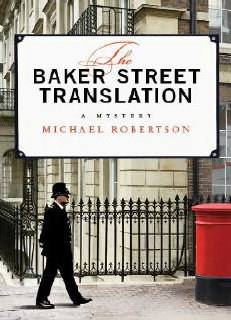 can’t remember a time when he didn’t want to be a writer. He attended law school in southern California, worked for a while in New York City and for a Silicon Valley startup, and then for a technology group in the U.S. and England. Along the way Robertson tried writing screenplays, stage plays, and short fiction. “I got continually better at writing along the way, but didn’t make money for a very long time,” he says.
can’t remember a time when he didn’t want to be a writer. He attended law school in southern California, worked for a while in New York City and for a Silicon Valley startup, and then for a technology group in the U.S. and England. Along the way Robertson tried writing screenplays, stage plays, and short fiction. “I got continually better at writing along the way, but didn’t make money for a very long time,” he says.
In 2006, Robertson registered for the SDSU Writers’ Conference and he brought the first ten pages of his book, The Baker Street Letters, for evaluation. He adds, “When I met with an editor at the conference, she said that she wouldn’t suggest changing a single word of what I wrote. She invited me to submit the full manuscript to her publishing house–with the caveat that it might take six months to a year for them to respond, which is not surprising since the few publishing houses willing to look at unagented material have deep backlogs.”
“Unfortunately, nine months later the editor of the publishing house left, the direction of the company changed, and my manuscript went unread. These things happen. Editors and agents have their own lives and careers, and people move about. I suspect that most writers come close many times before the stars finally align,” Robertson says.
Having a positive experience with the SDSU Writers’ Conference, Robertson kept the glowing comments he received from the editor. After his setback he would pull those comments out of his drawer, read them and continue writing. Robertson adds, “The first rule in attending the conference is to have fun. Think of it as a weekend getaway. There’s no rule that says that you have to come back from the conference with an agent or a book contract, and if that does happen at your first conference (and especially if it’s for your first book), you may regard yourself as both brilliant and also a bit lucky. Second, if you’re pitching in an interview, don’t worry that you’ll mess up. In total, I must have pitched to a dozen agents and editors. Every one of them knew how to get me back on track–even when I once broke out in a nervous sweat and actually forgot the name of my first novel.”
The conference boasts many known agents, editors, and writers. “You’ll get inspired by the writers and receive great input from the editors and agents. And, if you’re not from southern California, you might enjoy spending a few hours in January at the beach,” Roberts says.
 Today, Robertson writes a mystery series called The Baker Street Letters, published by St. Martin’s/Minotaur. The most recent in the series is The Baker Street Translation (April 2013); the next is Moriarty Returns a Letter (available January 28, 2014). As you might expect from the title, there’s a Sherlockian connection (but Sherlock Holmes doesn’t exist in his books). Robertson adds, “I write about a London barrister who foolishly locates his new law chambers in an office building that occupies the space on Baker Street where 221B would have been, if only it were real. By doing so, he becomes responsible for dealing with the letters that people have been addressing to Sherlock Holmes since the 1890s.”
Today, Robertson writes a mystery series called The Baker Street Letters, published by St. Martin’s/Minotaur. The most recent in the series is The Baker Street Translation (April 2013); the next is Moriarty Returns a Letter (available January 28, 2014). As you might expect from the title, there’s a Sherlockian connection (but Sherlock Holmes doesn’t exist in his books). Robertson adds, “I write about a London barrister who foolishly locates his new law chambers in an office building that occupies the space on Baker Street where 221B would have been, if only it were real. By doing so, he becomes responsible for dealing with the letters that people have been addressing to Sherlock Holmes since the 1890s.”
Robertson has parting advice to writers regarding writing and conferences, “Remember that there are conferences, and there is writing. Do both. You can enjoy a conference without having a product to sell, but if you want to make a career out of writing, you will need to sit down and write. On the other hand, if all you do is write, no one else will see or buy the wonderful thing you want to share. You need to get out at some point and mingle with other people who do what you do, and with the people who are willing to buy it. That’s when you go to the conference.”